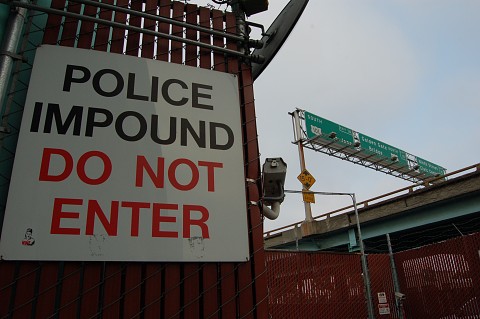




Oct 28
The Right Of The Police To Impound Your Car – A New Colorado Case Calls Into Question A Troubling Practice

By H. Michael Steinberg Colorado Criminal Defense Lawyer
The Right Of The Police To Impound Your Car – A New Colorado Case Calls Into Question A Troubling Practice A new Colorado case may bring to an end the indiscriminate impounding of cars by Colorado police departments.
In the case of People v. Carl A. Brown, 2016COA150 (October 20, 2016) the Colorado Court of Appeals held that Colorado police department policies permitting the impounding of a vehicle, when the driver is given a traffic ticket, must still satisfy the requirements of the Fourth Amendment.
The Typical Fact Pattern For A Colorado Automobile Impoundment – Seizure
Known as the ” Impoundment and Inventory Search” procedure, the typical fact pattern is as follows:
1. The police pull a car over for an alleged traffic violation – such as a Stop Sign Violation.
2. When it is discovered that the Driver has a invalid driver’s license, he is also cited for Driving on a Suspended License and is not allowed to drive further.
3. The Driver is not arrested.
4. Even though the car can be safely locked and legally left at the scene – the car is impounded – towed and searched under the “inventory search” procedure permitted under Colorado law.
5. Drugs or some other form of contraband are located inside the car.
6. The Driver is then charged with a much more serious charge arising out of the inventory search.
The Issue: If The Police Create The Reason For The Inventory Search – Is This Legal?
The Fourth Amendment And “Inventory Searches” – The Analysis
The Fourth Amendment to the United States Constitution prohibits unreasonable searches and seizures.
Under the Fourth Amendment, searches conducted without a warrant are presumptively unreasonable, unless the search comes within an exception to the warrant requirement.
The prosecution bears the burden of overcoming this presumption by establishing one of these exceptions.
There is a well recognized exception to the search warrant requirement that “permits officers to conduct an inventory search of a vehicle without a warrant based on probable cause when that vehicle is lawfully impounded by law enforcement officials.
The Colorado case of Colorado v. Bertine, 479 U.S. 367, 371-72 (1987) permits inventory searches as part of law enforcement’s so called ” care taking” function. The legal games being played here are based on the premise that an “inventory search” of the seized vehicle is “designed to protect the owner’s property while it is in police custody, to insure against claims concerning lost or damaged property, and to protect the police from any danger posed by the contents of the vehicle.”
The Rub – the Decision to Impound a Vehicle and the Ensuing Inventory Search Are Separate Processes, Both Must Pass Muster Under The Fourth Amendment
Before the police can impound a vehicle and conduct an inventory search in Colorado they must establish the legal validity of the impoundment.
The ACT OF IMPOUNDMENT” must be legally sustainable BEFORE the actions of the police in conducting an inventory search will be permitted.
Since impoundment of a private vehicle is a “seizure” within the meaning of the Fourth Amendment, it must be performed
“…in furtherance of “public safety” or “community caretaking functions,” such as removing “disabled or damaged vehicles” and “automobiles which violate parking ordinances and which thereby jeopardize both the public safety and the efficient movement of vehicular traffic.”
Therefore before the police can conduct the “inventory search” in accordance with their internal police procedures the criteria used to justify the seizure must satisfy the Fourth Amendment.
What Makes An Impoundment Reasonable Under The Fourth Amendment?
The Colorado Court of Appeals struggled with the issue of what criteria to apply to analyze a legal seizure of a vehicle where there has been a traffic stop. The Court found that the ARREST of the Driver/Defendant was the single most important issue in the analysis.
The Court examined certain fact patterns where a seizure had been sustained as legal:
1. A seizure where the Driver/Defendant was arrested and the car is towed because, if left in the area, it would probably be stolen.
2. The Driver/Defendant is arrested and there is no passenger with a valid driver’s license to drive the car from the scene.
3. The Driver/Defendant was DUI and the decision to tow based on the remote location of the stop and the possibility of vandalism because the vehicle was from out of state.
The Court heavily focused on the fact that the Driver/Defendant was NOT ARRESTED.
The reasoning the Court finally used to resolve this issue was this:
When a “driver is only ticketed but cannot himself operate the car because of an expired license, impoundment of the vehicle is improper unless the driver is ‘unable to provide for its custody or removal.’” 3 Wayne R. LaFave, Search and Seizure § 7.3(c) (5th ed. 2012)
I read the decision as creating this rule: If a car is in a safe location and not impeding traffic and there is no need to protect the vehicle or to avoid a safety hazard to other drivers, it cannot be impounded without another legally sufficient reason.
Just because a Colorado Police “department policy” allows officers to impound a vehicle, a Colorado police officer’s decision to impound that vehicle must still satisfy the requirements of the Fourth Amendment and it is THE STATE who must meet the burden of proof that the seized car and the subsequent inventory search was lawful.
If a DA /prosecutor fails to develop facts or other evidence that makes the seizure of a vehicle lawful and reasonable – such as a lack of registration, the absence of insurance, and the like – the “impoundment decision” may be unconstitutional.
Summary And Conclusion
To pass muster under the Fourth Amendment, a police officer’s decision to impound a vehicle must further “public safety” or “community caretaking functions” such as removing “disabled or damaged vehicles” and “automobiles which violate parking ordinances and which thereby jeopardize both public safety and the efficient movement of vehicular traffic.”
Simply because a Colorado police department has “internal regulations” that authorize a vehicle to be impounded, the “criteria” that allows that seizure must be reasonable in light of the Fourth Amendment.
The Right Of The Police To Impound Your Car – A New Colorado Case Calls Into Question A Troubling Practice
If you found any of the information I have provided on this web page article helpful please click my Plus+1 or the Share buttons for Twitter and Facebook below so that others may also find it.
The reader is admonished that Colorado criminal law, like criminal law in every state and at the Federal level, changes constantly. The article appearing above was accurate at the time it was drafted but it cannot account for changes occurring after it was uploaded.
If, after reading this article, you have questions about your case and would like to consider retaining our law firm, we invite you to contact us at the Steinberg Colorado Criminal Defense Law Firm – 303-627-7777.
Never stop fighting – never stop believing in yourself and your right to due process of law. You will not be alone in court, H. Michael at your side every step of the way – advocating for justice and the best possible result in your case.
 ABOUT THE AUTHOR: H. Michael Steinberg – Email The Author at [email protected] – A Denver Colorado Criminal Defense Lawyer – or call his office at 303-627-7777 during business hours – or call his cell if you cannot wait and need his immediate assistance – 720-220-2277. Attorney H. Michael Steinberg is passionate about criminal defense. His extensive knowledge and experience of Colorado Criminal Law gives him the edge you need to properly handle your case.
ABOUT THE AUTHOR: H. Michael Steinberg – Email The Author at [email protected] – A Denver Colorado Criminal Defense Lawyer – or call his office at 303-627-7777 during business hours – or call his cell if you cannot wait and need his immediate assistance – 720-220-2277. Attorney H. Michael Steinberg is passionate about criminal defense. His extensive knowledge and experience of Colorado Criminal Law gives him the edge you need to properly handle your case.
“A good criminal defense lawyer is someone who devotes themselves to their client’s case from beginning to end, always realizing that this case is the most important thing in that client’s life.”
You should be careful to make a responsible choice in selecting a Colorado Criminal Defense Lawyer – and we encourage you to “vet” our firm. Over the last 40 plus years – by focusing ONLY on Colorado criminal law – H. Michael has had the necessary time to commit to the task of constantly updating himself on nearly every area of criminal law, to include Colorado criminal law and procedure and trial and courtroom practice. H. Michael works hard to get his clients the best possible results in and out of the courtroom. He has written, and continues to write, extensively on Colorado criminal law and he hopes this article helps you in some small way – The Right Of The Police To Impound Your Car – A New Colorado Case Calls Into Question A Troubling Practice.

You Might Also Enjoy:
- 2016 Colorado’s Good Samaritan Drug Overdose Law 18-1-711 Is Expanded TO Children Reporters In 18-13-122(7)(a)
- Drug Lab Fraud – The Re-Emerging Question Regarding Drug Labs – A Need For Retesting Evidence
- Colorado Criminal Law – Amendment 64 – What Happens When The Penalty For A Colorado Crime Changes?
- Colorado Appeals Court Says Right To Refuse A Search Of Your Car Is Not Evidence Of Guilt
- Colorado Knock and Talk Laws In Drug Crime Investigations – Use Of The “Knock and Talk” Trick And The Fourth Amendment












